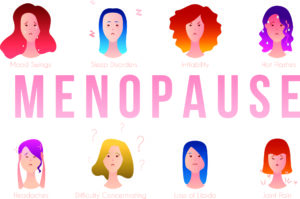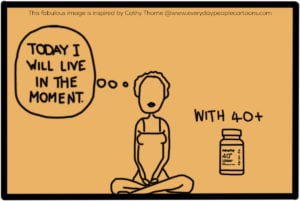Are dizziness and nausea getting to you?
We hear you!
But before you jump to conclusions and wonder if there’s something seriously wrong with you, know that these can be common signs of menopause. Or – rather – perimenopause, the lead-up to the transition.
And it’s due to the hormonal shifts that are going on at this time, particularly a drop in estradiol. The estrogen that’s most common during your reproductive years.
NB: The term estrogen actually refers to a group of estrogens. Estradiol mentioned above, estriol which is dominant during pregnancy and estrone – the weaker estrogen of post-menopause.
Can menopause cause dizziness?
The truth is, it can.
There are a whole lot of hormonal and health changes going on in your body in perimenopause and it culminates in post-menopause.
And while dropping estrogen levels can be one factor, dizziness can be the result of other issues linked with menopause such as middle ear, blood sugar levels and migraines.
There are three types of dizziness during perimenopause:
- Lightheadedness– when you feel a bit woo-woo or faint.
- Vertigo– when the room feels like it’s spinning.
- Disequilibrium– when you feel unbalanced or unsteady on your feet.
Did you know changes to our vestibular system1 (or inner ear) occur too? Indeed, it’s not just your ovaries, it’s every single part of your body from the heart, to the brain, hands and feet and ears. In fact, that’s why tinnitus (ringing in the ears) can occur in some women.
And your inner ear? It’s essential to your balance and disruption triggers ‘the dizzies’.
We’re very happy to give you some good news though! Menopausal dizziness should diminish and/or cease once you’re through into post-menopause. Unless you’re dizzy for non-hormonal reasons.
Did you know? Dehydration can cause dizziness so make sure you’re drinking enough water. About 2 – 2 ½ litres on the daily.
You might like Yes, It’s True. Dizziness At Perimenopause Is Common

Can menopause cause nausea?
At the risk of sounding repetitive, yes, it can!
Again, we’re not wanting to be like a parrot but there are a whole lot of hormonal and health changes going on during the menopause transition.
And it’s a gradual process so in our experience, the body (and brain!) needs some time to adjust.
Some women can and do experience nausea which may be for a number of reasons including hot flushes and a drop in estrogen.
Indeed, the digestive system2 can also be impacted therefore gut issues can be another reason.
Food intolerances (which can raise their heads post-40) can also be a factor.
And so can heart disturbances and migraines.
You might like Women Like Us Share Real Stories Of Menopause: Vanessa
Our favourite ways to help dizziness and nausea at menopause
1. Stay hydrated
Your midlife body loves pure, filtered water and herbal teas. Seriously. It literally thrives on them so ensure you’re hydrated at all times to stave off not just ‘the dizzies’ and nausea but brain fog, fatigue and bloating.
2. Drink ginger tea
Nothing beats the real stuff, so grate fresh ginger and steep it in boiling water. Easy peasy. Drink it hot or cold. A mint leaf adds a nice kick of freshness.
3. Include protein and fat each time you eat
This helps to keep blood sugar nice and stable. Note: blood sugar rises simply because you eat but you want it to stabilise again quickly and protein and fat help do this. Goodies such as nuts, eggs, almond butter and avocado.


4. Stay chilled out aka relaxed.
We can’t say it often enough. We’re such stress bunnies today. Just 15 minutes of deep breathing or mindfulness can help. Our favourite method is 4-7-8. Let all the air out of your lungs then breathe in for 4, hold for 7 and exhale for 8. Rinse and repeat.
5. Get onto Merry Peri® and Perky Post®
A key tool is getting support. Merry Peri® and Perky Post® are designed to be your wingwomen and support you through those perimenopause and post menopause woes!
Conclusion
Are menopause symptoms temporary?
It gives us great pleasure to say that many of the signs and symptoms of perimenopause aren’t with you for life. And nausea and dizziness fall into this camp.
In fact, they may only be raising their heads because you’re dehydrated or hungry for good, wholesome food. So always look there first. And add a backstop with some evidence-based helping hands like Merry Peri® and Perky Post®.
With regard to how long signs and symptoms last – as you know every woman is different. So for some of you, unwanted signs may continue for a long period of time.
For this reason, it’s important to check in with your doctor to ensure nothing else is going on. But take heart in the knowledge that for most women nausea and dizziness should pass.
Disclaimer: Please note, if you’re feeling continuously dizzy or nauseous it’s best to check in with your doctor. There are many different possible reasons including a sinus or viral infection, low blood pressure, low iron or it could be pointing to something less simple.
Share with a friend
Sign up to our mailing list for the latest news and stories and receive a $5 discount code to redeem on your first purchase, plus receive a 3-step eBook on ways to support your body through menopause.
This site is protected by reCAPTCHA and the Google Privacy Policy and Terms of Service apply.
Related Articles
References:
- Park JH, Viirre E. Vestibular migraine may be an important cause of dizziness/vertigo in perimenopausal period. Med Hypotheses. 2010 Nov;75(5):409-14. doi: 10.1016/j.mehy.2009.04.054. Epub 2010 Aug 6. PMID: 20692105.
- Palomba S, Di Cello A, Riccio E, Manguso F, La Sala GB. Ovarian function and gastrointestinal motor activity. Minerva Endocrinol. 2011 Dec;36(4):295-310. PMID: 22322653.











